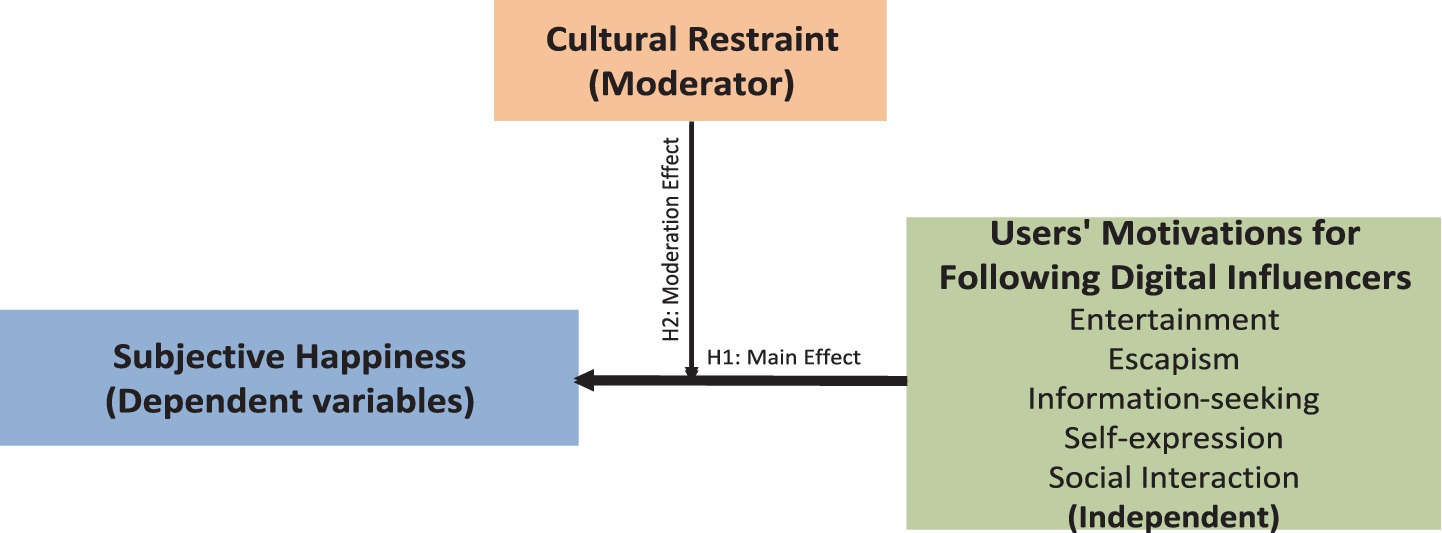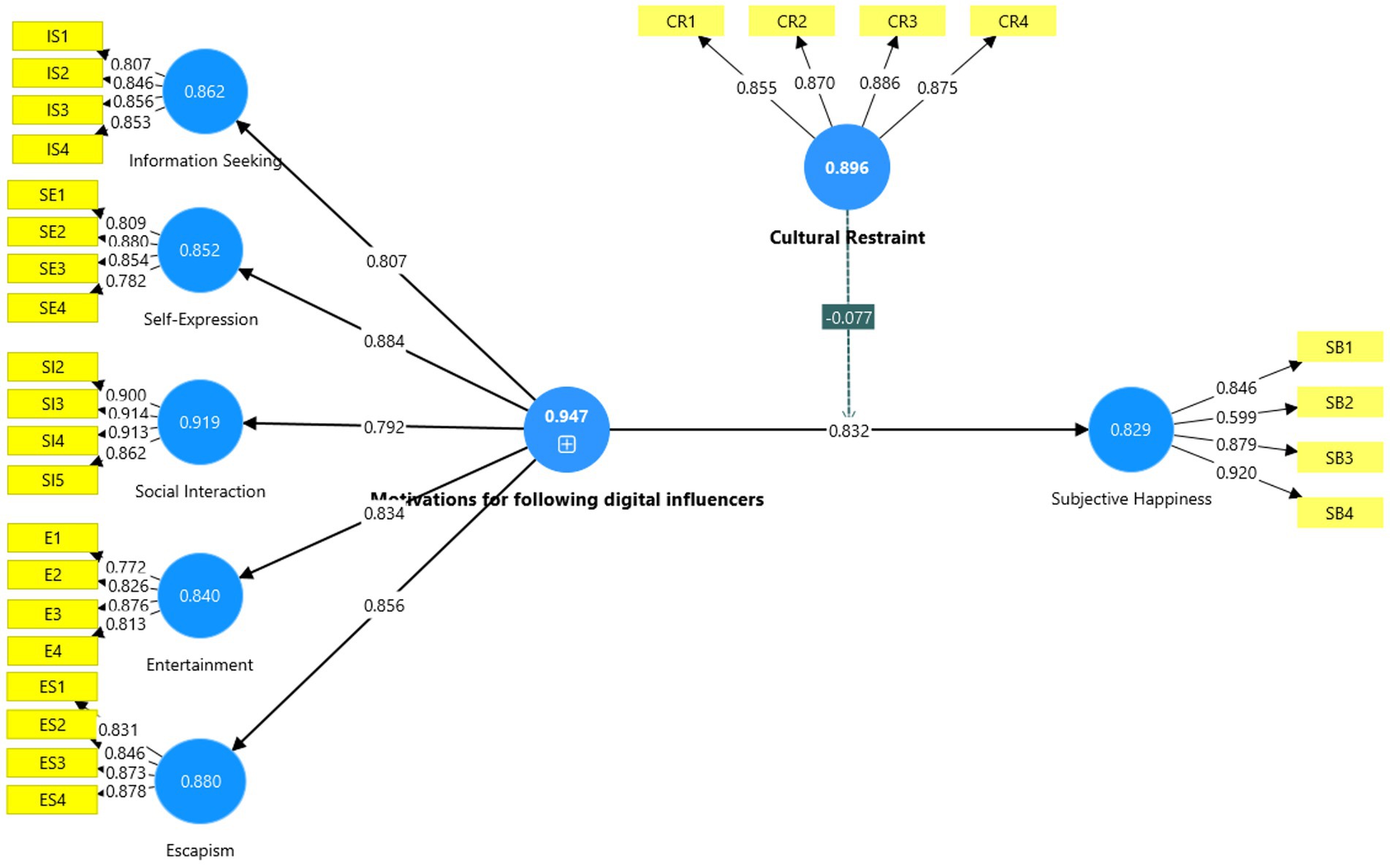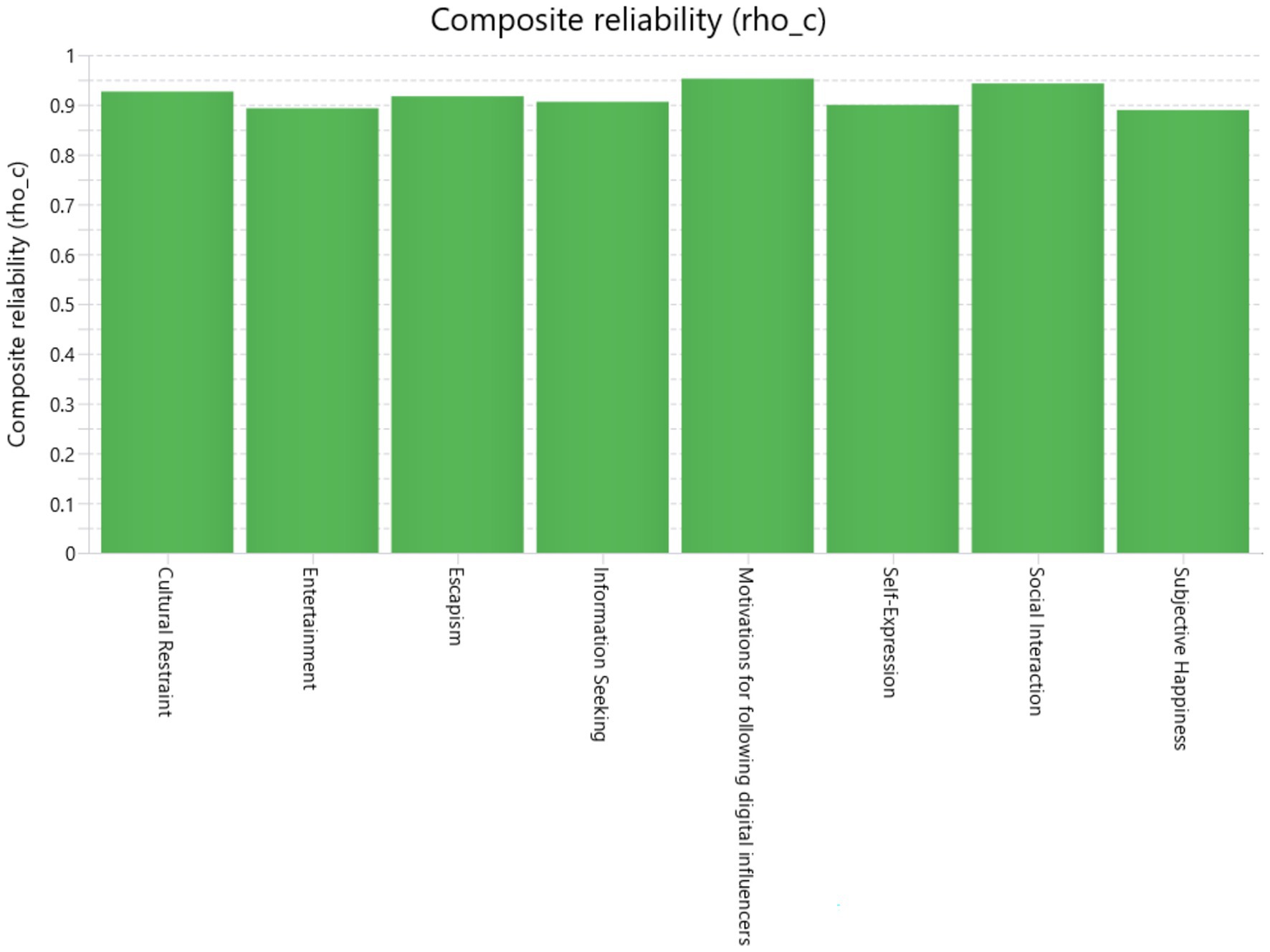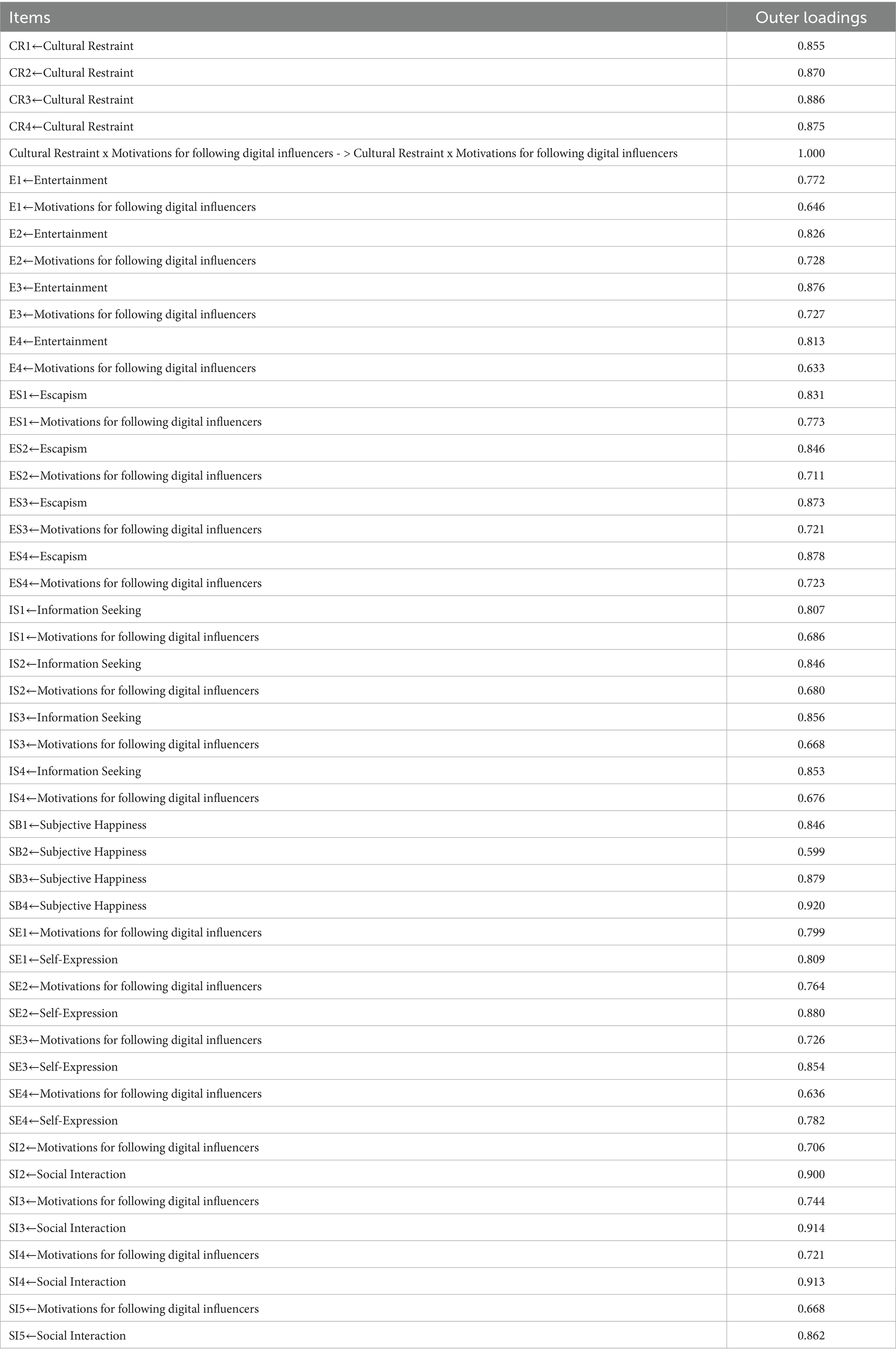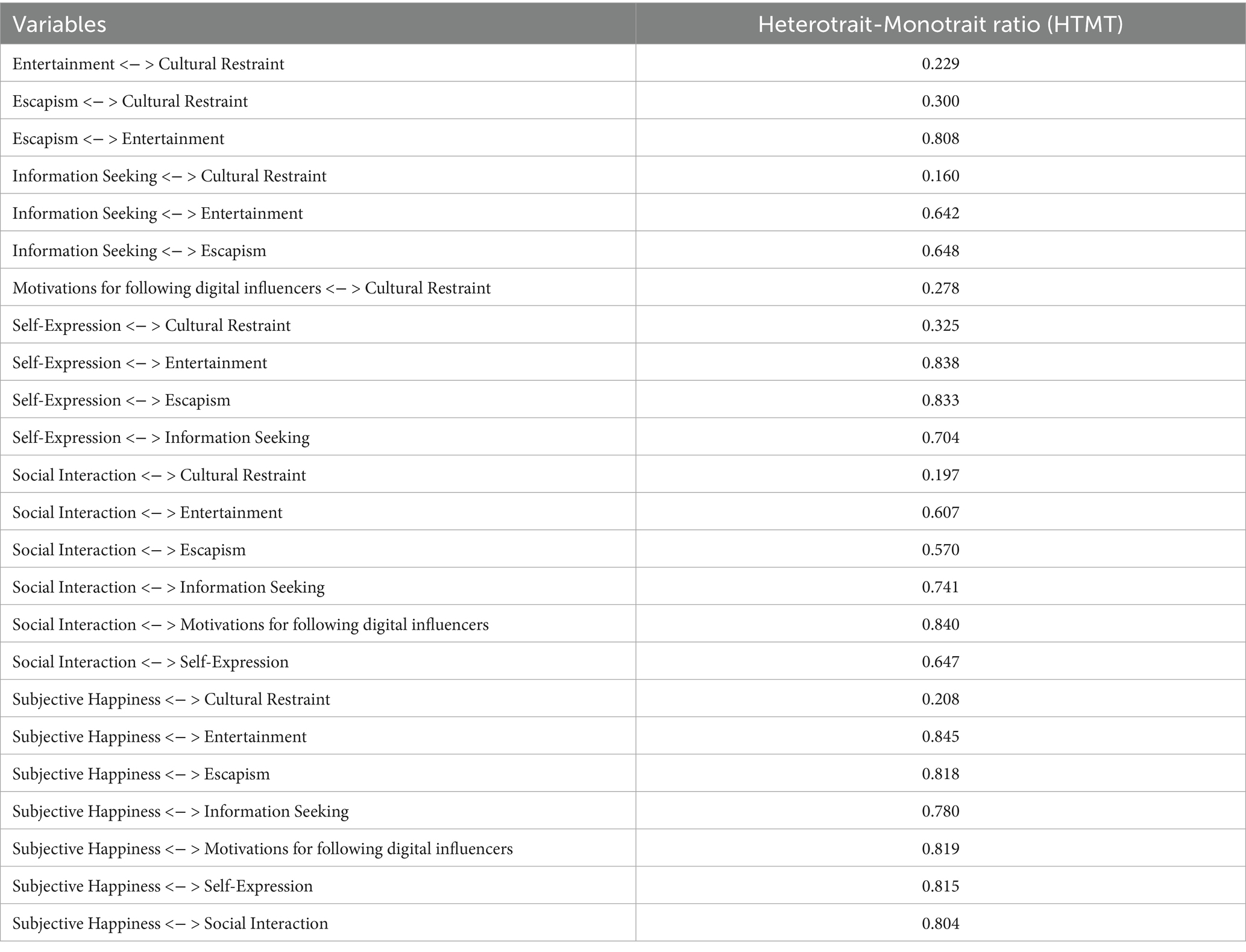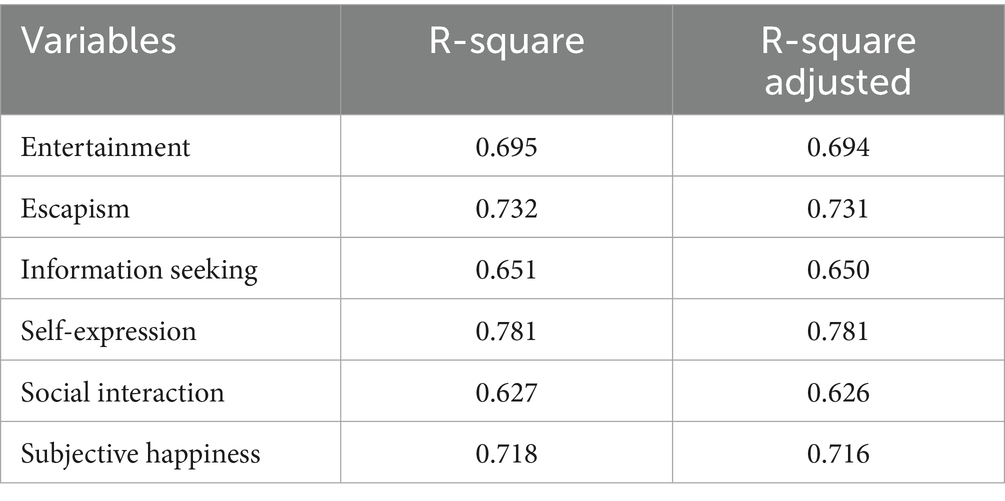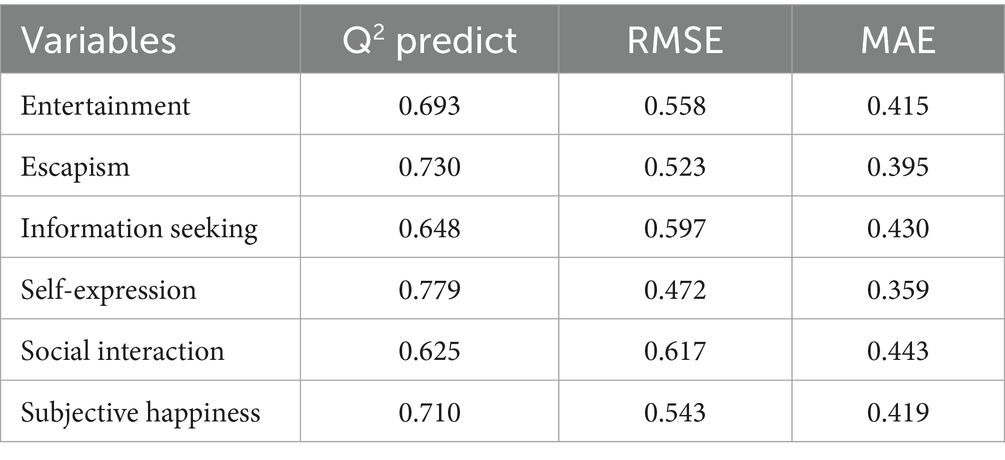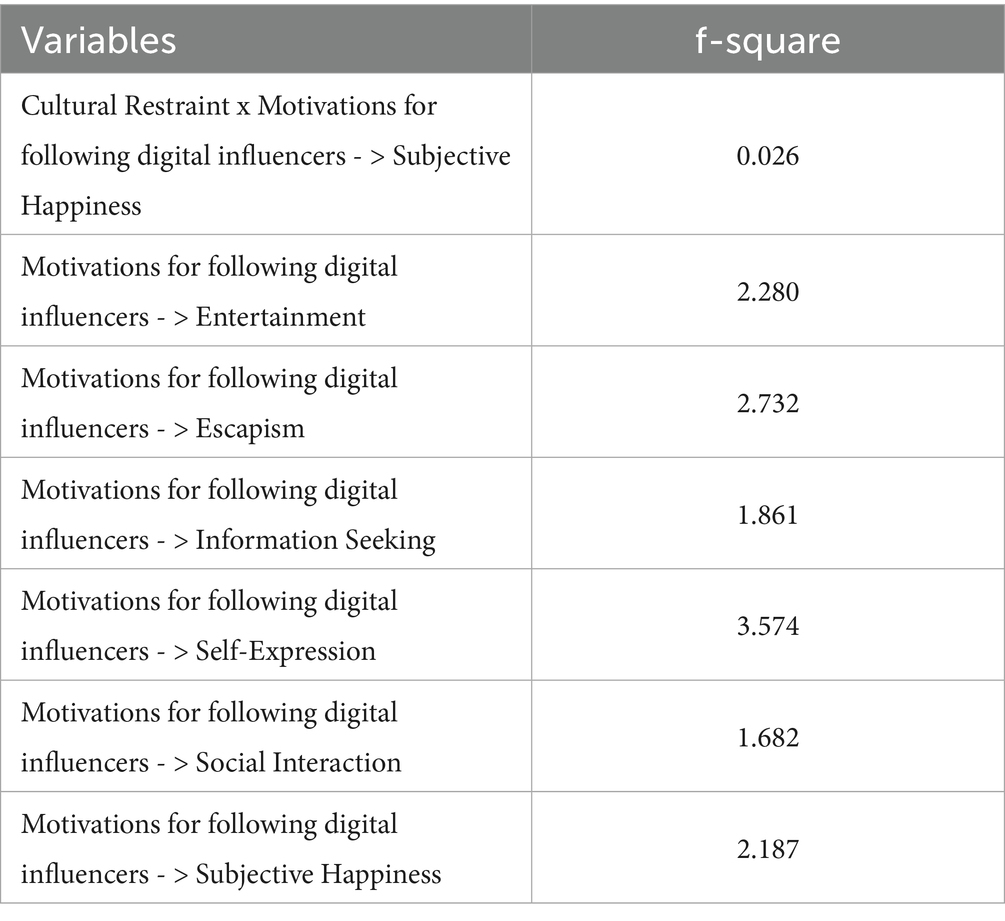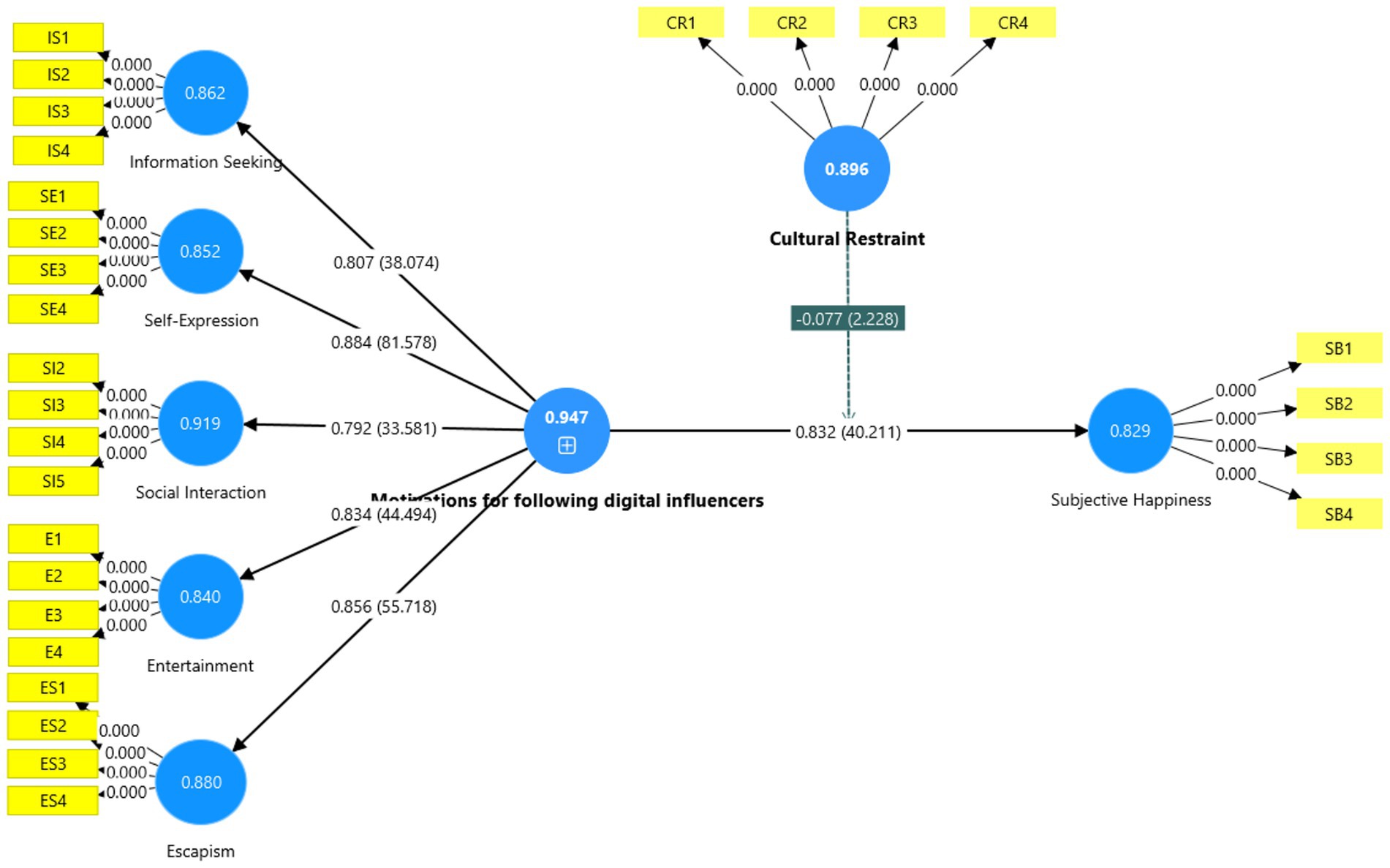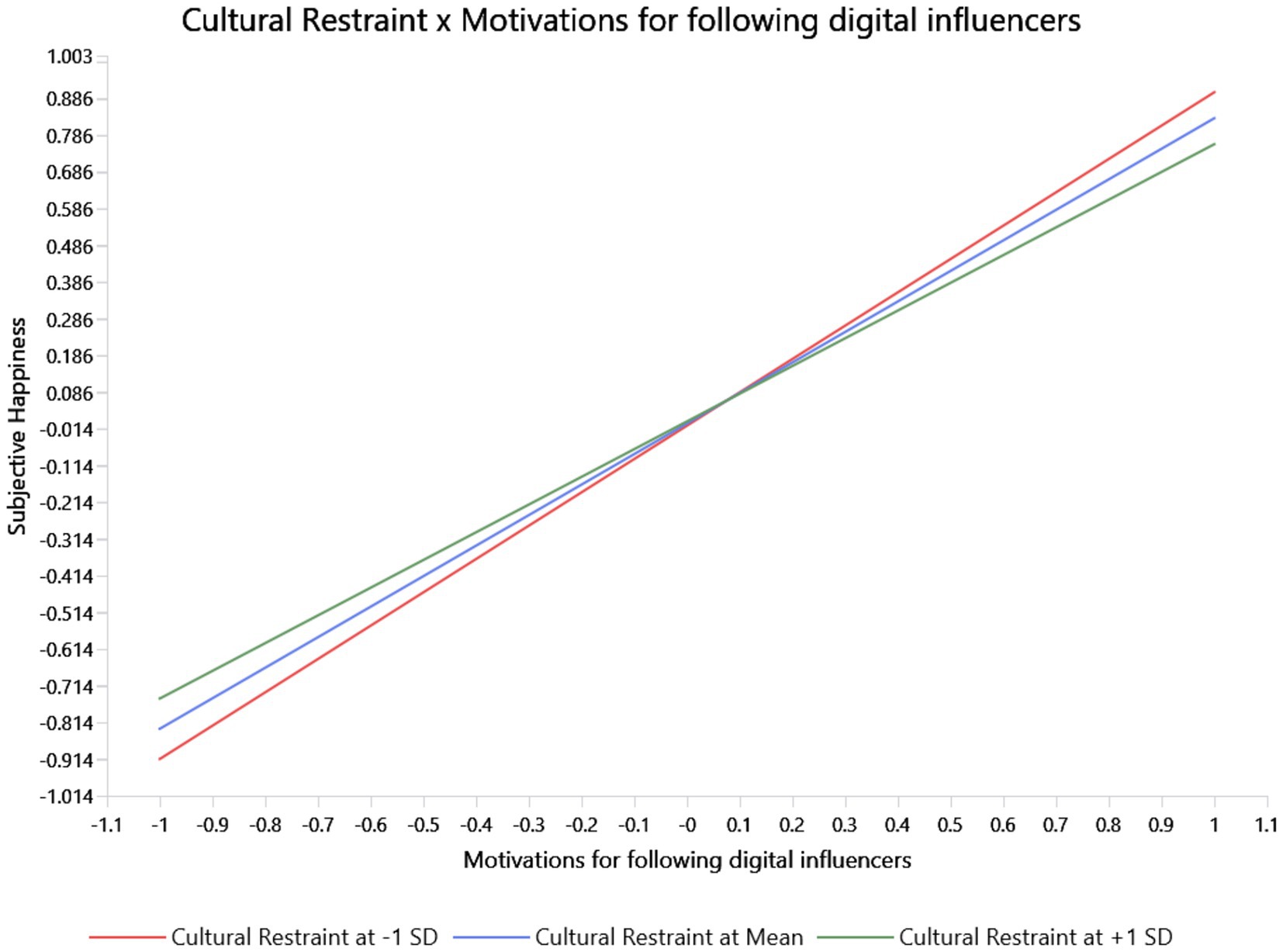- 1Department of Media and Communication Technology, Faculty of Media, Jadara University, Irbid, Jordan
- 2Department of Mass Communication, College of Communication, University of Sharjah, Sharjah, United Arab Emirates
This study aims to discover the relationship between university students’ motivations for following digital influencers and their subjective happiness, combining a novel theoretical approach that integrates the Uses and Gratifications Theory (UGT) and Hofstede’s cultural dimension of restraint versus indulgence. Via a quantitative approach employing Partial Least Squares Structural Equation Modeling (PLS-SEM), data were collected from 650 Jordanian university students. Results showed a strong positive association between motivations for following digital influencers—including entertainment, escapism, information-seeking, self-expression, and social interaction—and subjective happiness. Additionally, cultural restraint significantly moderates this relationship, diminishing the positive impact of influencer-following motivations on subjective happiness in highly restrained cultural contexts. These findings offer critical insights into the nuanced chemistry between individual motivations, cultural values, and psychological well-being, emphasizing the importance of considering cultural restraint moderation effects in digital media research. Practically, the study provides essential guidance for content creators, educators, and policymakers aiming to enhance user well-being through culturally sensitive digital media strategies. This research significantly extends existing literature by demonstrating the pivotal role of cultural factors in shaping the psychological outcomes of digital influencer engagement.
1 Introduction
In recent years, social media platforms have spread all over the world and turned the world into a small village, becoming like a warm cup of morning coffee (Hatamleh et al., 2023a; Kaye, 2021). Social media platforms provide spaces for interaction, identity performance, and emotional expressions that transcend traditional geographic and cultural boundaries. Yet, as social media becomes increasingly embedded in daily routines, questions about its psychological effects, particularly on subjective happiness and digital well-being—have grown more pressing (Hatamleh et al., 2023b; Kross et al., 2021; Steinert and Dennis, 2022). While Hatamleh et al. (2023b) offer valuable insights into how cultural restraint moderates the impact of social media motivations on subjective happiness, their study primarily addresses direct motivations and cultural moderation using a general youth sample in Jordan. In contrast, the current study advances this line of inquiry by focusing specifically on users’ motivations for following digital influencers—a distinct and contextually relevant practice shaping contemporary social media engagement. Moreover, this study integrates Hofstede’s Indulgence versus Restraint (IVR) dimension within a broader theoretical framework that combines Uses and Gratifications Theory with cultural theory, thereby offering a more nuanced understanding of how cultural norms influence the psychological outcomes of influencer-following behaviors.
Additionally, this work expands the methodological scope by addressing subjective happiness as from by digital-influencer-specific motivations, rather than general platform use motivations. Finally, through an enhanced moderation model, this study seeks to deliver theoretical and practical insights tailored to digital marketing and cultural adaptability, particularly within conservative societies like Jordan—thereby broadening both scholarly and applied relevance.
Among the most influential developments in the digital landscape is the emergence of digital influencers—individuals who cultivate large followings through the strategic sharing of curated content and direct engagement with audiences (Abidin, 2016; Sokolova and Kefi, 2020). These influencers are more than content creators; they often function as lifestyle icons, emotional support figures, and aspirational role models (Casaló et al., 2020; Xu et al., 2024; Makrides, 2021). Users follow influencers for a range of motives, including entertainment, escapism, information-seeking, self-expression, and social interaction (Wang et al., 2025; Sheldon and Bryant, 2016). Despite the popularity of influencer content, there remains a limited understanding of how these motivations affect users’ psychological states—particularly subjective happiness, defined as one’s overall emotional evaluation of life satisfaction (Lyubomirsky and Lepper, 1999; Lee et al., 2021; Malik et al., 2016).
While prior research has explored the general impacts of social media on well-being—with some studies associating it with lower psychological health (Twenge, 2019; Mathers et al., 2009) and others linking it to greater happiness and life satisfaction (Doğan, 2016; Kwon and Park, 2020)—fewer studies have investigated the motivations driving social media use, particularly in relation to influencer-following behavior. The Uses and Gratifications Theory (UGT) provides a useful framework for this investigation, stating people proactively pursue media in an endeavor to fulfill certain psychological and social needs (Katz et al., 1973; Ferris et al., 2021; Bae, 2023; Yang et al., 2021). Used in digital influencer scenarios, UGT dictates motivations such as emotional connection, personal inspiration, and social validation are pivotal in defining user experience (Sheldon and Bryant, 2016; Wang et al., 2025).
Nevertheless, though UGT captures individuality of agency, it has a tendency to omit how cultural values influence to what degree users are able to seek and experience gratification. This shortcoming can be filled by incorporating Hofstede’s (2011) Dimensions of Culture Theory and in particular its Indulgence versus Restraint (IVR) dimension. While in restrained societies societal norms suppress outward expression of emotions along with the search for pleasure, conformity and self-restraining are valued. On the other hand, in indulgent societies freer expression of emotions and seeking pleasure are allowed (Hofstede et al., 2010; Chudnovskaya and O’Hara, 2022; Ruiz-Equihua et al., 2020).
This is especially important in non-Western countries like Jordan, which is described by Hofstede as very restrained. Cultural expectations about family honor, modesty, and controlling emotions can influence what influencers people follow, but also how people respond to such information and what emotional returns they gain. Even when users are encouraged to follow influencers for entertainment, escapism, or self-expression, cultural restraint will suppress such emotional payoffs of such interaction, lessening their effect on subjective happiness (Hatamleh et al., 2023b; Aleqedat et al., 2022; Al Omoush et al., 2012).
Recent empirical findings support this theoretical link. Hatamleh et al. (2023b) demonstrated that cultural restraint significantly moderates the relationship between social media motivations and subjective happiness. Users in high-restraint cultures like Jordan were found to engage with social media more for practical or informational purposes than for emotional or hedonic reasons (Chua and Chang, 2016; Tien et al., 2021), thus weakening the positive association between social media motivations and well-being.
Despite the growing scholarly interest in digital well-being, few studies have examined how cultural restraint operates within digital environments, particularly as a moderating factor between motivations and psychological outcomes. This represents a significant research gap—especially in Arab societies, where deeply rooted cultural norms continue to influence personal behavior, including online engagement.
Accordingly, this study seeks to extend the UGT framework by integrating Hofstede’s cultural dimensions, particularly the IVR construct, to investigate how culture shapes the relationship between social media motivations and subjective happiness. This leads to the following research questions:
RQ1: What is the influence of users’ motivations for following digital influencers on their subjective happiness?
RQ2: What is the moderating effect of cultural restraint between users’ motivations for following digital influencers and subjective happiness?
2 Literature review
2.1 Social media use and subjective happiness
The increasing integration of social media into everyday life has sparked significant interest in its psychological effects, particularly its relationship with subjective happiness. Subjective happiness is defined as an individual’s cognitive and affective evaluation of their overall life satisfaction and emotional well-being (Lyubomirsky and Lepper, 1999). As social media platforms become central to communication, entertainment, and self-expression, researchers have attempted to assess whether these digital interactions enhance or undermine users’ happiness.
A substantial body of research suggests that excessive or passive social media use can negatively affect well-being. Passive consumption—such as endlessly scrolling through curated posts—has been linked to increased feelings of envy, loneliness, and reduced self-esteem, all of which may contribute to lower happiness (Twenge, 2017; Mathers et al., 2009). Such outcomes are often attributed to upward social comparisons, where users evaluate their lives against idealized portrayals of others.
Conversely, other studies have found that active and purposeful engagement with social media can enhance happiness. Users who interact with others through comments, messages, or content sharing may experience increased social support, emotional connection, and a stronger sense of community (Doğan, 2016; Hatuka and Zur, 2020). For instance, when individuals use social media to maintain relationships, express themselves creatively, or consume inspiring content, they may feel more connected and emotionally fulfilled.
Despite these contrasting findings, much of the existing research remains generalized, focusing on overall social media use without distinguishing between different types of content or user motivations. As digital influencers gain prominence on platforms like Instagram, YouTube, and TikTok, they represent a distinct category of content producers whose interactions with followers are often personal, emotionally engaging, and aspirational. However, limited research has examined how motivations for following influencers such as entertainment, escapism, or self-expression—relate to subjective happiness.
Moreover, the influence of cultural context on this relationship is frequently overlooked. Since happiness is a culturally sensitive construct, the emotional outcomes of media use may vary depending on the societal norms and values that shape users’ expectations and behavior. Thus, understanding how specific motivations tied to influencer engagement affect happiness, especially within culturally restrained societies,presents a valuable and underexplored area of research.
This study addresses this gap by investigating how users’ motivations for following digital influencers influence their subjective happiness, applying the lens of the Uses and Gratifications Theory (UGT) and considering cultural moderators.
2.2 Uses and Gratifications Theory and influencer-following motivations
Katz et al. (1973) proposed Uses and Gratifications Theory (UGT), UGT provides a helpful framework that give deeper understanding why individuals select certain media. UGT considers audiences to be active decision-makers who seek out media to satisfy specific psychological and social needs, as opposed to passive consumers. People use media for different reasons, such as entertainment, information gathering, and self-status, or maintaining relationships with others.
UGT is important when we look at social media, and More accurately, why individuals follow influencers. Unlike traditional mass media, which is mostly one-way and entertainment-driven, social media allows users to personalize their experience to a much greater extent (Sheldon and Bryant, 2016; Molnar, 2021). UGT helps explain the range of motivations behind that engagement, from curiosity and inspiration to emotional support and a sense of community.
The motivations for the following influencers can be grouped into several key categories:
• Entertainment: Users seek enjoyable content that amuses or relaxes them, especially as a way to unwind or cope with stress (Bae, 2023; Cook et al., 2022; Freitas et al., 2021).
• Escapism: Influencers offer a temporary mental escape from the demands of everyday life, often through aspirational content, storytelling, or lifestyle portrayal (Anderson, 2023; Baker and Baker, 2023).
• Information-seeking: Many followers look to influencers for tips, advice, or updates about fashion, health, technology, or trends (Thelwall, 2021; Pfender and Bleakley, 2024).
• Self-expression and identity: Users follow influencers who reflect their personal values, lifestyle aspirations, or social beliefs, reinforcing their sense of self and belonging (Kerley, 2024; Nash, 2024).
• Social interaction: Engagement through comments, likes, and direct messages creates a sense of community and connection (Delbaere et al., 2021; Purnama and Asdlori, 2023).
These motivations are not mutually exclusive and often overlap depending on individual user needs and cultural contexts (Price and Applebaum, 2022; Basedow and Kuitunen-Paul, 2022). For example, a user might follow a travel influencer for both escapism and practical tips on destinations, while also identifying with the influencer’s values and aesthetics.
Influencers, in turn, cater to these needs by crafting content that aligns with audience expectations, offering tutorials, behind-the-scenes insights, emotional narratives, or real-time engagement through live sessions (Aldlimi et al., 2025). This dynamic, interactive relationship aligns strongly with UGT’s premise that users turn to media that gratifies their unique personal and emotional needs (Schaap and de Rooij, 2025).
However, the effectiveness of these gratifications—particularly their impact on subjective happiness—may be shaped by external factors, including cultural values and social norms. In culturally restrained societies, where the pursuit and expression of personal gratification may be discouraged, these motivations may not yield the same psychological benefits. Therefore, while UGT is instrumental in identifying why users follow influencers, its integration with cultural dimensions theory can provide a more holistic understanding of how these motivations translate into emotional outcomes like happiness.
2.3 Indulgence versus restraint
Hofstede’s (2011) cultural dimensions theory remains a cornerstone for understanding how values, behaviors, and social interactions differ across cultures. The six dimensions—Power Distance, Individualism vs. Collectivism, Masculinity vs. Femininity, Uncertainty Avoidance, Long-Term vs. Short-Term Orientation, and Indulgence vs. Restraint (IVR)—offer a solid framework for exploring the ways in which societies shape people’s worldviews and day-to-day choices. Each of Hofstede’s six cultural dimensions reflects core values that shape how people see the world, interact with others, and make everyday decisions.
One dimension that has not gotten as much attention—yet is especially relevant in the digital age—is Indulgence versus Restraint (IVR). In cultures that lean toward indulgence, there’s a strong focus on enjoying life, fulfilling personal desires, and openly expressing happiness. On the other hand, restraint-oriented cultures emphasize self-control, discourage seeking pleasure for its own sake, and tend to follow stricter social rules around what’s considered acceptable behavior. These cultural leanings do not just affect individuals—they also influence how people consume media and engage online (Hofstede, 2011; Todea and Harin, 2024).
This is particularly interesting when looking at how people interact with digital influencers. In more indulgent societies, influencer content—whether it’s lifestyle tips, entertainment, or just feel-good posts—is often embraced as a source of joy and escape. It’s easier for users in these cultures to feel a genuine boost in happiness when engaging with such content (Hatamleh et al., 2023a). But in cultures where restraint is the norm, like Jordan, things play out a bit differently. Even if people follow influencers for fun or to feel socially connected, cultural expectations might hold them back from fully enjoying that experience. As Aleqedat (2021) notes, this can water down the emotional benefits that influencer content might otherwise bring.
The sixth and most recently introduced cultural dimension, elaborated in our 2010 publication, adopts Minkov’s concept of Indulgence versus Restraint. This dimension, derived from recent World Values Survey data, complements the earlier framework by addressing aspects not covered by the original five dimensions, particularly those related to happiness research. It shows a weak negative correlation with Long-Term versus Short-Term Orientation (Li et al., 2022).
Indulgence refers to societies that permit relatively free gratification of basic and natural human desires associated with enjoying life and having fun (Heydari et al., 2021). In contrast, restraint characterizes societies that regulate the fulfillment of needs through the imposition of strict social norms and expectations. Data on this dimension have been collected for 93 countries and regions, with validation studies confirming its relevance across diverse cultural settings (Todea and Harin, 2024).
Societies characterized by indulgence typically report a higher proportion of individuals who describe themselves as very happy, coupled with a stronger sense of personal agency and life control. In these societies, freedom of speech is valued highly, leisure time is considered essential, and positive emotions are more frequently recalled. In addition, indulgent societies are also found to have more births among well-educated people, more participation in sport activities, and more cases of obesity where food is in abundance. More permissive sexual norms are also adopted in wealthier indulgent societies and keeping a strict national order is not held in top priority (Todea and Harin, 2024).
On the other hand, in societies with constraints, fewer people are very happy, and individuals tend to experience a greater perception of external control in their lives (Hofstede, 2011). Freedom of speech is viewed as less important, and recreation is ranked lower. Positive emotional episodes are less likely to be remembered, and birth rates tend to remain low even in educated communities. Participation in sports tends to be less widespread, and despite the availability of food, obesity rates are generally lower. In affluent restrained cultures, stricter sexual norms prevail, and there is a stronger emphasis on societal order, often reflected by a higher number of police officers per capita (Aleqedat, 2021).
Geographically, indulgent cultures are predominantly found in South and North America, Western Europe, and parts of Sub-Saharan Africa. By contrast, restraint tends to characterize societies in Eastern Europe, Asia, and much of the Muslim world (Hatamleh et al., 2023a). Mediterranean Europe is in a median location between the two extremes of culture (Chue and Yeo, 2023).
This variable deepens our insights into cultural diversity since it brings to the fore the matter of societies differing in regulating human desires and seeking happiness in addition to differing in values and behaviors.
2.4 Hypothesis development
2.4.1 Influence of users’ motivations for following digital influencers on their subjective happiness
The Uses and Gratifications Theory (UGT) focuses on users of media seeking to meet unique psychological and social requirements (Katz et al., 1973). For digital influencers, users’ motivations tend to include entertainment, escapism, information searching, self-expression, and social interaction (Sheldon and Bryant, 2016; Wang et al., 2025). These motivations are each important in their influence on users’ emotional experiences, and it is proposed that meeting these requirements through influencer interaction will have a positive effect on subjective happiness.
Prior studies validate that active, deliberate social media use—following influencers for purposeful reasons—can improve users’ emotional well-being (Doğan, 2016; Chiu et al., 2013). For example, entertainment and escapism bring about emotional relief from daily stressors and diversion of attention away from them (Casaló et al., 2020). Information seeking also brings a sense of competence and mastery over one’s surroundings (Casaló et al., 2020). Just the same way, following influencers for self-expression and social interaction allows users to establish their identity and intensify feelings of belonging, strongly connected to higher subjective happiness (Abidin, 2016; Phu and Gow, 2019).
In addition, parasocial bonds—those one-way emotional relationships users establish with influencers—can serve in much the same way real social bonds might by providing companionship, validation, and emotional support (Horton and Wohl, 1956; Sokolova and Kefi, 2020). Such bonds, fostered through sustained interaction with influencers, can sustain users’ sense of connectedness and have a positive impact on their subjective well-being assessments.
Despite the growing importance of digital influencers in users’ lives, relatively few studies have empirically examined how the specific motivations for following these figures affect subjective happiness, particularly within culturally diverse contexts. Given the emotional gratifications users derive from influencer content and the potential for enhancing well-being, it is reasonable to expect that motivations such as entertainment, escapism, information-seeking, self-expression, and social interaction will be positively associated with users’ subjective happiness.
Accordingly, the following hypothesis is proposed:
H1: There is a positive relationship between the influence of users’ motivations (Entertainment, Escapism, Information-seeking, Self-expression, and Social Interaction) for following digital influencers and their subjective happiness.
2.4.2 Cultural restraint as a moderator
While the Uses and Gratifications Theory (UGT) emphasizes individual agency in selecting and engaging with media to satisfy personal needs—such as entertainment, escapism, information-seeking, self-expression, and social interaction—it does not fully address the broader cultural frameworks that condition how such gratifications are pursued or experienced. A particularly relevant framework is Hofstede’s (2011) and Hofstede et al. (2010) cultural dimension of Indulgence versus Restraint (IVR), which refers to the extent to which societal norms either permit or suppress the expression and fulfillment of individual desires.
In restrained cultures, social norms encourage emotional regulation, modesty, and self-discipline, often limiting individuals’ ability to openly pursue pleasure or gratification. As such, even if users are intrinsically motivated to participate in digital influencers—pursuing entertainment, emotional catharsis, or self-expression—these motivations are less likely to be translated to subjective happiness in more restraint-oriented cultures, in which emotional expressiveness and leisure are culturally valued and even fostered (Hofstede et al., 2010; Ruiz-Equihua et al., 2020; Chudnovskaya and O’Hara, 2022).
This cultural tension is especially evident in societies like that of Jordan, a country considered by Hofstede to be a high-restraint culture. Here, societal norms around gender roles, control of emotions, and group values can limit how users interact with influencer materials—particularly those advocating individualism, luxuries, or openness about emotions. Users might struggle internally or even with a sense of guilt when consuming such materials and in so doing compromise the psychological gains they would normally experience (Aleqedat et al., 2022; Al Omoush et al., 2012; Hatamleh et al., 2023a).
This is consistent with what is found in empirical studies. Hatamleh et al. (2023a), for instance, discovered cultural restraint to be a negative moderator of social media motivations and subjective happiness. That is to say, people in high-restraining cultures utilize social media more for information purposes—i.e., information gathering—than for hedonic or expressive use (Chua and Chang, 2016). Therefore, social media motivations such as self-status or emotional expression are associated positively with happiness to a much smaller extent in restrained cultural contexts (Kaur et al., 2021; Valkenburg and Peter, 2009).
These results are also found in other culturally constrained societies. For example, in a study conducted in China, Hu et al. (2018) discovered that social media use was also mediated by cultural restraint in affecting well-being. Such findings highlight the necessity of incorporating cultural models into such media effect theories as UGT, especially when examining emotional consequences such as happiness.
In recognizing culture’s influence, this work contributes a more complex portrait of the psychological impact of following digital influencers. The motivations to follow influencers might be ubiquitous and potentially global in scope, but emotionally they are enacted through culturally relative norms and expectations.
Accordingly, the following hypothesis is proposed:
H2: Cultural restraint moderates the relationship between users’ motivations for following digital influencers (Entertainment, Escapism, Information-seeking, Self-expression, and Social Interaction) and their subjective happiness (see Figure 1).
Figure 1
3 Methodology
3.1 Research approach
This research employed a quantitative approach to research, commonly utilized to explore variable interdependencies through numerical data and statistical analysis (Creswell, 2014). The quantitative design allows for hypothesis testing and for drawing inferences about a larger population from a sample in a systematic and objective manner. The quantitative approach is best suited for studies designed to measure theoretical constructs such as social media motivations, subjective happiness, and cultural moderation through standardized measures (Hair et al., 2014). Detection of intricate relationships such as moderation effects is also achieved with a heightened statistical precision (Bryman, 2016).
3.2 Population and sampling
The target group in this research were Jordanian university students who are a group of individuals constantly exposed to influencer posts and are active users of digital media. University young adults are known to be early adopters of new platforms of emerging media and have complex consumption patterns of media. They are a good population to investigate digital citizenship and well-being (Kircaburun and Griffiths, 2018). Hatamleh et al. (2023a) confirms that university students the most active and largest segment use social media platform.
The convenience sampling technique was utilized to select participants. The technique samples respondents who are easily accessible and willing to participate. The non-probability sampling technique is widely used in social media and psychology studies due to its efficiency and accessibility in sampling unique groups (Etikan et al., 2016). Although convenience sampling is a limitation to the generalizability of a study, it is a good and viable technique to be utilized in exploratory and test theory studies in cases where it is employed in clearly defined boundary contexts.
3.3 Data collection
The data were collected through a self-administered online questionnaire, a time- and cost-effective means of gathering large volumes of data from scattered populations (Bryman, 2016). The questionnaire was sent to students in various Jordanian universities through institutional emails, social media groups, and student networks. The purpose of the study was explained to the respondents, their confidentiality assured, and their right to withdraw at any time notified. Electronic informed consent was gained prior to completing the questionnaire.
The survey contained questions assessing users’ motivations to follow digital influencers (i.e., entertainment, escapism, self-expression), cultural restraint perception, and subjective well-being. The measures for all constructs utilized scales previously validated in other studies to ensure content validity and reliability (Khan, 2017; Whiting and Williams, 2013; Lyubomirsky and Lepper, 1999; Al Omoush et al., 2012).
3.4 Data analysis
In order to test hypothesized relationships and interaction effects of moderation, we employed Partial Least Squares Structural Equation Modeling (PLS-SEM), facilitated through SmartPLS 4. PLS-SEM is particularly well-suited to exploratory studies and models incorporating complex latent constructs and interaction effects (Hair et al., 2017). It permits simultaneous measurement model (construct validity and reliability) and structural model (path relations) analysis and is well suited to theory testing and model development in behavioral science (Sarstedt et al., 2019).
Bootstrapping with 5,000 subsamples was used to evaluate path coefficients and cultural restraint’s moderation effect. The guidelines for model fit in composite reliability, average variance extracted (AVE), and discriminant validity were followed Henseler et al. (2015) and Hair et al. (2021).
3.5 Ethical considerations
The study followed set ethical guidelines for conducting studies on human subjects. The participation in the survey was voluntary, and all respondents were clearly told about the aim of the study, confidentiality of responses, and their right to withdraw from the study at any time without penalty.
An informed consent form was presented at the onset of the online survey. The respondents were asked to agree to it before continuing. No personally identifiable data were gathered to maintain respondents’ anonymity and confidentiality.
As Arabic is both the official and local language in Jordan, we translated the survey questionnaire into Arabic to facilitate full understanding among respondents. Translation was carried out by a qualified bilingual professional so that accuracy and cultural sensitivity would be assured.
Since the study entailed no physical or psychological risk and was confined to anonymous survey data, formal Institutional Review Board (IRB) approval was unnecessary according to the ethical regulations of the associated institution. This is in line with norms of minimal-risk survey studies in social science (Bryman, 2016; BPS, 2021).
All data were safely stored and solely utilized for academic purposes. The investigation adhered to the ethical guidelines set forth in the Declaration of Helsinki in ensuring respect, integrity, and transparency in human-subjects research.
3.6 Demographic questions
To better understand the characteristics of the sample, participants were asked to respond to several demographic questions. These included:
1. Gender
• Male
• Female
2. Age
• 18–20
• 21–23
• 24–25
3. Academic level
• First year
• Second year
• Third year
• Fourth year or above
4. Type of university
• Public University
• Private University
5. Daily use of social media
• Less than 1 h
• 1–3 h
• 4–6 h
• More than 6 h
3.7 Demographic results
A total of 650 valid responses were collected from university students across several Jordanian universities. The sample consisted of 388 females (59.7%) and 262 males (40.3%). With respect to age, the largest group of respondents were between 21 and 23 years old (45.5%), followed by those aged 18–20 years (38.6%), while 15.8% were in the 24–25 age group.
Regarding academic level, 30.2% of respondents were in their third year, 28.2% in their second year, 23.7% in their fourth year or above, and 18.0% were first-year students. In terms of type of university, 417 respondents (64.2%) attended public universities, while 233 respondents (35.8%) were enrolled in private universities.
Patterns of social media use revealed that 41.5% of participants reported daily usage of 4–6 h, while 27.7% indicated using social media for more than 6 h per day. Additionally, 24.0% reported using social media between 1 and 3 h daily, and only 6.8% reported using it for less than 1 h per day.
These findings offer a detailed description of the young adult student population in Jordan, in terms of their varied academic levels, sustained use of social media, and representative demographic structure in terms of gender. This type of sample is suitable for studies examining digital behavior and psychological consequences in Arab societies (Kircaburun and Griffiths, 2018; Hatamleh et al., 2023c).
3.8 Measurement scale
This survey employed validated and well-recognized measurement scales to evaluate the primary constructs: Motivations to follow digital influencers, Cultural Restraint, and Subjective Happiness. The items were measured on a Likert scale of 7 points from strongly disagree (1) to strongly agree (7). For testing the scales’ reliability, Cronbach’s alpha (α) was estimated, and all of them were above the criteria value of 0.70, demonstrating good internal consistency (Hair et al., 2021).
The Motivations for following digital influencers construct was theorized to be a second-order reflective construct with five first-order dimensions corresponding to the hypotheses of this study:
• Entertainment
• Escapism
• Information-Seeking
• Self-Expression
• Social Interaction
These dimensions are grounded in the Uses and Gratifications Theory (UGT), which emphasizes that individuals actively engage with media to fulfill psychological and social needs (Katz et al., 1973; Whiting and Williams, 2013). The measurement items were adapted from prior validated studies (Khan, 2017; Buzeta et al., 2020; Whiting and Williams, 2013; Gao et al., 2017).
In addition to Motivations for following digital influencers, the study measured:
• Cultural Restraint, using a scale adapted from Al Omoush et al. (2012), which reflects the extent to which individuals regulate emotional expression and behavior on social media.
• Subjective Happiness, using the widely cited scale by Lyubomirsky and Lepper (1999), capturing participants’ overall sense of happiness and life satisfaction.
The results showed that all constructs demonstrated high reliability and validity, as reflected in Cronbach’s alpha, Composite Reliability (CR), and Average Variance Extracted (AVE). Specifically:
• Motivations for following digital influencers (second-order) showed excellent reliability (α = 0.947; CR = 0.949),
• The five first-order dimensions also exceeded acceptable thresholds (α ranging from 0.840 to 0.919),
• Cultural Restraint (α = 0.896) and Subjective Happiness (α = 0.829) were also highly reliable.
These results confirm that the measurement model is robust and well-suited for hypothesis testing (see Table 1 and Figures 2, 3).
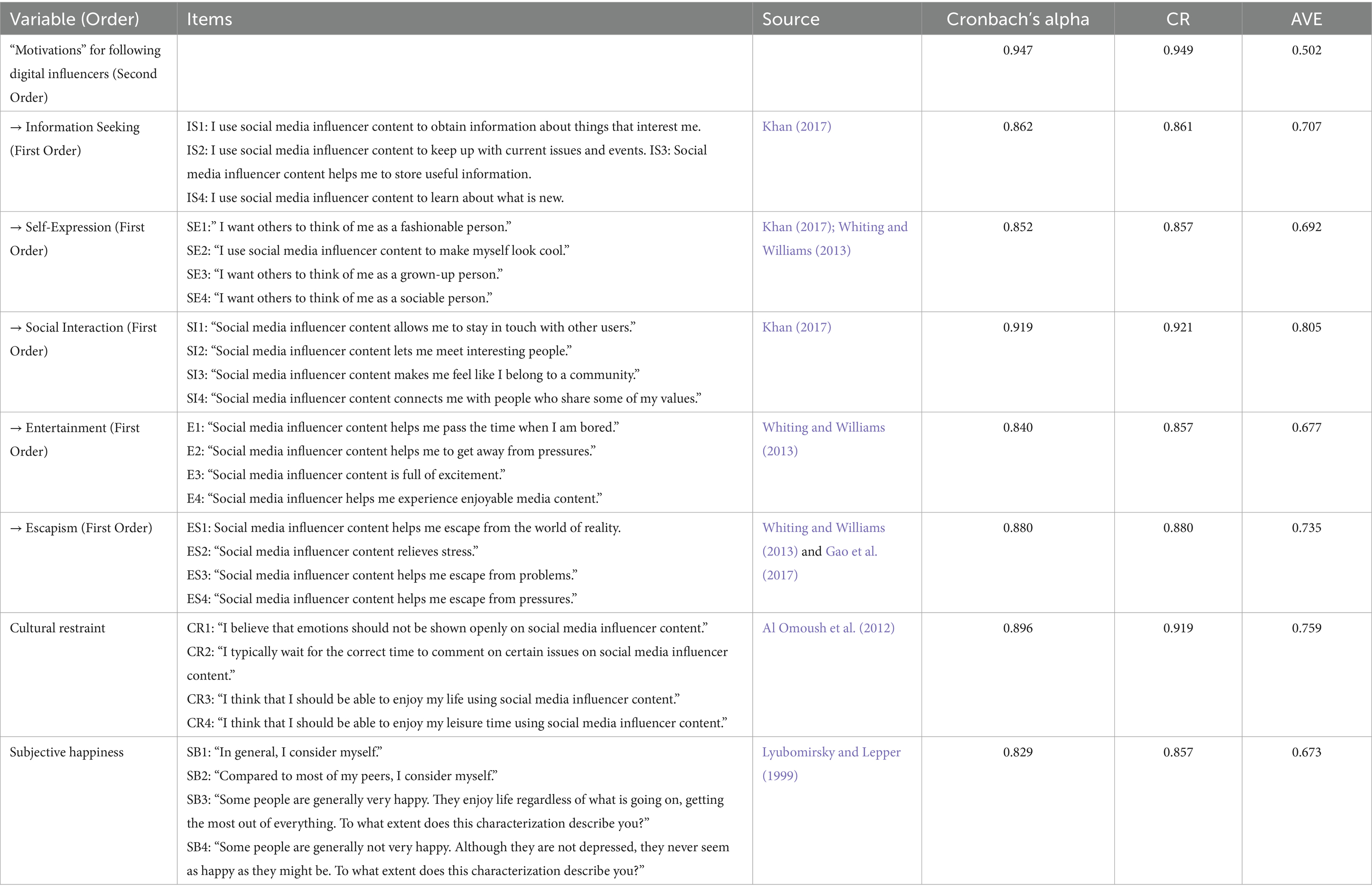
Table 1. Measurements scale, construct reliability and validity: Cronbach’s alpha, composite reliability (CR), and average variance extracted (AVE).
Table 2 presents the outer loadings of all measurement items on their respective constructs, reflecting how strongly each item contributes to its latent variable in the measurement model. Outer loadings are critical indicators of indicator reliability in structural equation modeling (SEM), and loadings above 0.70 are generally considered acceptable, while loadings above 0.80 are considered strong (Hair et al., 2021).
3.9 Cultural restraint
The items measuring Cultural Restraint (CR1–CR4) demonstrated excellent outer loadings, ranging from 0.855 to 0.886, confirming that these items strongly represent the construct. This suggests that participants consistently perceived these items as valid indicators of cultural restraint in the context of digital media use.
3.10 Motivations for following digital influencers
For the second-order construct of Motivations for Following Digital Influencers, the five first-order dimensions (Entertainment, Escapism, Information-Seeking, Self-Expression, and Social Interaction) also showed acceptable to excellent item loadings:
• Entertainment (E1–E4) had loadings between 0.772–0.876, indicating good reliability, although its second-order loadings were slightly lower (0.633–0.728), suggesting some variation in how entertainment items contribute to the higher-order construct.
• Escapism (ES1–ES4) demonstrated very strong loadings, both on the first-order level (0.831–0.878) and on the second-order level (0.711–0.773), confirming its central role in explaining motivations.
• Information-Seeking (IS1–IS4) showed good item reliability with first-order loadings between 0.807–0.856 and second-order loadings around 0.668–0.686, suggesting this dimension is well-captured in the model.
• Self-Expression (SE1–SE4) showed strong first-order loadings (0.782–0.880) and solid second-order loadings (0.636–0.799), indicating this dimension is an important part of overall motivation.
• Social Interaction (SI2–SI5) produced excellent first-order loadings (0.862–0.914) and acceptable second-order loadings (0.668–0.744), highlighting its robust contribution to the motivations construct.
3.11 Subjective happiness
The Subjective Happiness construct (SB1–SB4) displayed strong loadings for most items (SB1: 0.846, SB3: 0.879, SB4: 0.920), though SB2 (0.599) fell slightly below the 0.70 threshold. While one lower-loading item can be acceptable, future research may consider refining or rephrasing this item to improve scale performance (Hair et al., 2021).
3.12 Moderation term
The interaction/moderation effect between Cultural Restraint and Motivations (Cultural Restraint × Motivations for following digital influencers) reported a fixed loading of 1.000, as expected in PLS when creating interaction terms using the product indicator approach (Henseler and Fassott, 2009).
Overall, the measurement model shows excellent indicator reliability and supports convergent validity, with nearly all items exceeding the recommended loading thresholds. This justifies moving forward to the structural model analysis and hypothesis testing. The slightly lower loading on SB2 does not undermine the scale’s overall reliability but suggests it could be reviewed in future scale refinements.
These measurement results, together with the reported composite reliability and AVE values, confirm that the model is statistically robust and well-suited for testing the hypothesized relationships (see Table 2).
Table 3 presents the Heterotrait-Monotrait ratio (HTMT) values, which are used to assess the discriminant validity of the measurement model. Discriminant validity determines whether a construct is truly distinct from other constructs in the model, ensuring that each latent variable captures unique phenomena not reflected by other variables (Henseler et al., 2015).
The HTMT ratio is calculated by comparing the average correlations across constructs to the average correlations within constructs. As a rule of thumb, an HTMT value below 0.85 (conservative) or below 0.90 (liberal) indicates adequate discriminant validity, while values above these thresholds may signal problematic overlap between constructs (Hair et al., 2021).
In this study, all HTMT values were below the recommended thresholds, confirming that the constructs are sufficiently distinct. Although some motivational pairs (such as Self-Expression ↔ Entertainment = 0.838) approached the conservative cutoff, they remained within acceptable limits given their theoretical relatedness (See Table 3).
Table 4 reports the variance inflation factor (VIF) values, which are used to assess multicollinearity among the measurement items in the model. Multicollinearity refers to high correlations between predictors, which can distort regression estimates and weaken the reliability of statistical results (Hair et al., 2021).
As a general rule, VIF values:
Below 3.3 are considered acceptable and indicate no serious multicollinearity problems.
Above 5 signal potential multicollinearity concerns that require further investigation.
Above 10 are typically seen as problematic.
In this study, most VIF values ranged between 1.2 and 4.0, with the highest observed VIF at 4.054 (SI3), staying below the common threshold of 5. This indicates that multicollinearity is not a major concern in the measurement model. The interaction term (Cultural Restraint × Motivations for following digital influencers) has a fixed VIF of 1.000, which is standard in moderation models.
Overall, these results confirm that the indicators contribute uniquely to their constructs and that the structural estimates are not distorted by collinearity.
Table 5 reports the R-square (R2) and adjusted R-square values, which indicate the amount of variance explained by the predictors for each dependent variable. In structural equation modeling, R2 measures how well the independent variables account for the variance in the dependent variable, while the adjusted R2 accounts for the number of predictors, providing a more conservative estimate (Hair et al., 2021).
For this analysis, dependent variable Subjective Happiness has an R2 of 0.718 and an adjusted R2 value of 0.716, demonstrating that predictors such as motivations to follow digital influencers and cultural restraint account for nearly 72% of subjective happiness variability. This is a strong explanatory power and implies that the model is very effective in measuring the psychological consequences of social media consumption.
The first-order motivational facets (Entertainment, Escapism, Information Seeking, Self-Expression, Social Interaction) have good R2 values between 0.627 and 0.781, promising that the second-order construct (Following digital influencers’ motivations) indeed explains variation in these facets.
In general, these findings validate the model’s stability and capacity to meaningfully explain subjective happiness and associated motivational variables.
Table 6 presents the Q2 predict, Root Mean Square Error (RMSE), and Mean Absolute Error (MAE) values, which are used to assess the predictive power and accuracy of the model.
• Q2 predict evaluates the model’s out-of-sample predictive relevance, with values above 0 indicating good predictive ability (Hair et al., 2021).
• RMSE measures the average magnitude of prediction errors, where lower values indicate better model fit.
• MAE also measures prediction errors but focuses on absolute differences, with lower values reflecting better predictive accuracy.
For dependent variable Subjective Happiness, the model attained a Q2 predict of 0.710, an RMSE of 0.543, and an MAE of 0.419. These findings show that the model possesses excellent predictive significance and good accuracy in subjective happiness outcome forecasting.
The other motivational dimensions (Entertainment, Escapism, Information Seeking, Self-Expression, Social Interaction) also show high Q2 predict values (ranging from 0.625 to 0.779) and acceptable RMSE and MAE values, further supporting the model’s predictive strength.
Overall, these results confirm that the model not only explains but also accurately predicts key outcomes related to digital influencer engagement and subjective happiness.
Table 7 reports the f2 effect size, which measures the strength of the contribution of each predictor to the dependent variable. According to Cohen (2013), f2 values can be interpreted as:
• 0.02 = small effect
• 0.15 = medium effect.
• 0.35 = large effect.
For Subjective Happiness, the results show:
• Motivations for following digital influencers → Subjective Happiness (f2 = 2.187) → a very large effect, indicating that motivations play a major role in explaining happiness outcomes.
• Cultural Restraint × Motivations → Subjective Happiness (f2 = 0.026) → a small effect, suggesting that the moderating impact of cultural restraint is meaningful but modest.
For the motivational dimensions, the f2 values are also very large, especially for:
• Self-Expression (f2 = 3.574).
• Escapism (f2 = 2.732).
• Entertainment (f2 = 2.280).
These results confirm that the motivational constructs have a strong influence on both the first-order dimensions and subjective happiness, highlighting their importance in the model (see Table 7).
4 Hypothesis results and discussions
H1: Cultural restraint moderates the relationship between users’ motivations for following digital influencers (Entertainment, Escapism, Information-seeking, Self-expression, and Social Interaction) and their subjective happiness.
The results provide robust empirical support for Hypothesis 1, indicating a strong positive relationship between students’ motivations for following digital influencers and their subjective happiness. Specifically, the substantial path coefficient of 0.832, a t-statistic of 40.211, and an extremely significant p-value of 0.000 clearly affirm that students who actively engage with influencer content driven by entertainment, escapism, information-seeking, self-expression, and social interaction experience higher subjective happiness (see Table 8 and Figure 4).
These findings strongly align with the theoretical premises of the Uses and Gratifications Theory (UGT), which argues that media audiences proactively seek content that satisfies specific psychological and social needs (Katz et al., 1973). Consistent with UGT, the study demonstrates that influencer content effectively meets various intrinsic motivational needs, thereby enhancing students’ subjective well-being. Entertainment and escapism motivations bring emotional relief and mental relaxation, alleviating stress and creating positive states of emotions (Sheldon and Bryant, 2016; Armbrecht and Andersson, 2020; Hashemiannejad et al., 2016). Motivation to seek information creates a sense of knowledge and competence in students and is directly related to subjective well-being (Casaló et al., 2020; Ryan and Deci, 2000). Self-expression motivations also allow learners to validate individual selves and follow ego-related goals in line with a sense of autonomy and happiness (Valkenburg and Peter, 2009).
In addition, social interaction motivations significantly contribute to happiness by satisfying the necessary human need for social connectivity and emotional support. This concurs with previous studies demonstrating that social interaction through digital platforms is able to consolidate feelings of belonging and alleviate loneliness, impacting psychological well-being considerably (Phu and Gow, 2019; Hatuka and Zur, 2020). Moreover, parasocial bonds—emotional bonds users form with influencers—can potentially replicate social contacts in real life, supporting emotional validation, companionship, and encouragement among students and contributing to overall happiness (Sokolova and Kefi, 2020; Horton and Wohl, 1956).
Significantly, these results offer important insights into how digital influencer interaction can have a significant positive impact on subjective well-being in a culturally constrained setting in Jordan. Even though cultural expectations might suppress emotional expression and seeking pleasure, results show that purposeful and motivational digital influencer interaction can bring significant psychological gains. Results fill an important gap in literature addressing previous studies’ shortcomings in failing to account for cultural moderation effects (Aleqedat et al., 2022; Hatamleh et al., 2023b).
In practical terms, such findings highlight the potential of digital influencer content to contribute positively to youth well-being. Teachers, policymakers, and digital influencers can apply such insights to encourage media consumption towards fulfilling psychological and affective purposes to support healthful digital lifestyles and good mental health among young adults.
In conclusion, the strong empirical support for Hypothesis 1 underscores the substantial impact that motivations for following digital influencers have on subjective happiness. This emphasizes both the theoretical relevance of integrating UGT into digital influencer research and the practical value of promoting motivationally driven, purposeful engagement with influencer content among university students in restrained cultural contexts.
H2: Cultural restraint moderates the relationship between users’ motivations for following digital influencers (Entertainment, Escapism, Information-seeking, Self-expression, and Social Interaction) and their subjective happiness.
The results provide empirical support for Hypothesis 2, confirming that cultural restraint significantly moderates the relationship between students’ motivations for following digital influencers and their subjective happiness. Specifically, the moderation path coefficient was found to be −0.077, with a t-statistic of 2.228 and a significant p-value of 0.026, indicating a meaningful negative moderation effect (see Table 9 and Figure 4).
This finding indicates that the positive impact of motivations such as entertainment, escapism, information-seeking, self-expression, and social interaction on subjective happiness diminishes in culturally restrained contexts. The negative sign of the moderation path suggests that in societies characterized by high cultural restraint—such as Jordan—individuals’ emotional and psychological benefits derived from digital influencer engagement are reduced compared to those experienced in less restrained cultures.
Theoretically, this outcome aligns with Hofstede (2011) cultural dimension theory, specifically the dimension of indulgence vs. restraint, in explaining how cultural norms affect expression of emotions, gratification, and individual happiness. In restrained societies, cultural norms generally discourage direct expression of emotions, restrict self-gratification and encourage conformity to social norms and humility (Ruiz-Equihua et al., 2020; Hatamleh et al., 2023b). As a result, even when users are motivated to consume influencer content, cultural norms may suppress or weaken the emotional gratification and subjective happiness potentially gleaned from such engagements.
These assertions are also held to be correct through empirical evidence, with such restrained societies exhibiting diminished psychological payoffs to digital media interaction on account of internalized modesty norms, emotional suppression, and conformity (Aleqedat et al., 2022; Al Omoush et al., 2012). The present work adds to this literature through evidence demonstrating specifically how cultural restraint serves to function as a boundary condition in restricting positive emotional payoffs to motivated social media use.
In a practical sense, this observation brings to the forefront the value of cultural factors in social media interventions for promoting psychological well-being. Policymakers, schools, and digital influencers need to be aware that cultural context can have a profound impact on psychological gains yielded by digital content.
Tailoring content to respect and reflect cultural values and sensitivities could potentially mitigate the diminishing effect of cultural restraint, optimizing positive outcomes for users in restrained societies.
In summary, Hypothesis 2 is supported, demonstrating that cultural restraint meaningfully moderates and reduces the strength of the relationship between motivations for following digital influencers and subjective happiness. This moderation highlights the critical role of cultural context in shaping emotional and psychological responses to digital media engagement.
Figure 5 presented illustrates the moderation effect of Cultural Restraint on the relationship between Motivations for following digital influencers and Subjective Happiness. Specifically, it demonstrates how the relationship between motivations and subjective happiness varies at three different levels of cultural restraint: low (−1 SD, shown in red), medium (mean, shown in blue), and high (+1 SD, shown in green).
From this graph, we can observe clearly that the slope representing the relationship between motivations and subjective happiness is steepest when cultural restraint is low (red line). This indicates a stronger positive relationship between motivations for following digital influencers and subjective happiness among individuals experiencing lower levels of cultural restraint.
Conversely, at higher levels of cultural restraint (green line), the slope becomes less steep, indicating a weaker relationship between motivations and subjective happiness. Thus, as cultural restraint increases, the strength of the positive relationship between motivations for following digital influencers and subjective happiness decreases.
The middle line (blue) represents the mean level of cultural restraint, indicating a moderate strength relationship between motivations and subjective happiness.
Overall, this figure visually confirms the statistical moderation results previously discussed (Hypothesis 2), clearly showing that cultural restraint negatively moderates (weakens) the influence of motivations for following digital influencers on subjective happiness.
5 Contribution, limitations, and future directions
This study contributes significantly to the existing literature by integrating the Uses and Gratifications Theory (UGT) with Hofstede’s cultural dimensions framework, particularly focusing on the Indulgence versus Restraint (IVR) dimension. By examining how cultural restraint moderates the relationship between motivations for following digital influencers and subjective happiness, the research addresses a critical gap identified in previous studies, which often overlooked the cultural context in digital media research. The study provides robust empirical evidence demonstrating that users’ motivations significantly enhance subjective happiness, reinforcing the applicability of UGT in contemporary digital influencer contexts, even within culturally restrained societies like Jordan.
The practical implications are substantial, suggesting that digital influencers, content creators, and policymakers could strategically craft and promote content aligned with specific motivational drivers, enhancing young adults’ psychological well-being. Additionally, understanding how cultural restraint influences media engagement outcomes can guide more culturally sensitive approaches to digital marketing and public communication, optimizing the positive impact of digital media.
However, this research is not without limitations. First, the study employed convenience sampling among university students, limiting the generalizability of findings beyond the context of Jordanian higher education. Future research might employ more representative or varied samples to improve external validity. Second, use of self-report measures brings with it the potential for social desirability bias or subjective response influencing response accuracy. Future studies might mix methodology by incorporating qualitative insights gathered through interviews or group discussions to cross-validate and strengthen the quantitative results.
Furthermore, although this study has been successful in examining the moderating effect of cultural restraint, other cultural factors or contextual variables such as religious influence, economic situation, or gender roles may also influence the influencer-following motivations and happiness. Subsequent studies are invited to investigate these other moderating or mediating variables in order to give a more in-depth insight into digital well-being in different cultural contexts.
While this study successfully sheds light on the moderating role of cultural restraint, it zeroes in on just one cultural dimension. Future research would benefit from widening the lens to include other cultural or contextual factors—like gender norms, religiosity, or socioeconomic status—as possible moderators or mediators. These elements could deeply shape how users connect with digital influencers and the emotional or psychological value they derive from those interactions. Taking a multi-dimensional cultural approach would help build a more complete and accurate picture of digital well-being across diverse communities. Managerial Implications: These findings offer several valuable lessons for businesses, marketers, and influencers alike. In culturally restrained communities such as Jordan, campaigns that lean too heavily on pure entertainment often fall flat. To be effective, marketers need to strike a careful balance—blending entertainment with culturally grounded values, useful information, and socially relevant themes. Influencers, too, must move beyond simply amusing their audiences. Content that nurtures a sense of community and reflects shared norms tends to resonate more deeply. For brands, this expands the influencer’s role: from being just a product endorser to becoming a trusted voice that builds loyalty and aligns messages with cultural expectations.
Societal and Policy Implications: These insights extend beyond business into society and policy. Policymakers could partner with influencers to promote health, education, and national visions like Vision 2030—while keeping messages culturally sensitive. Universities can strengthen digital literacy programs to help youth critically engage with influencer content and use social media in healthier ways. Emphasizing cultural restraint may protect well-being by reducing consumerism and unrealistic portrayals. Future longitudinal research could track how motivations, influencer roles, and media habits evolve over time, offering stronger evidence and richer insights for both theory and practice.
6 Conclusion
In conclusion, this study shows that motivations to follow digital influencers have a strong positive effect on subjective happiness in university students and also highlights cultural restraint as a key moderator. The results emphasize the significance of merging cultural dimensions with media gratification theories and underline that cultural context has a decisive influence on psychological consequences of digital media consumption. The findings bring important guidance towards future studies and practical interventions to maximize young adults’ subjective well-being through well-informed and culturally aware digital consumption strategies.
Data availability statement
The raw data supporting the conclusions of this article will be made available by the authors, without undue reservation.
Ethics statement
The studies involving humans were approved by Jadara University code of approval E-29. The studies were conducted in accordance with the local legislation and institutional requirements. Written informed consent for participation was not required from the participants or the participants' legal guardians/next of kin because Informed consent was obtained from all participants prior to completing the survey. Participation was voluntary, anonymous, and involved no personal or identifying information. Written informed consent was not required due to the anonymous and minimal-risk nature of the online survey, in accordance with institutional guidelines and the ethical regulations of the Hashemite Kingdom of Jordan.
Author contributions
IH: Software, Methodology, Writing – review & editing, Funding acquisition, Supervision, Investigation, Writing – original draft, Conceptualization, Resources, Formal analysis, Data curation, Visualization, Project administration, Validation. AA: Project administration, Conceptualization, Funding acquisition, Validation, Resources, Visualization, Software, Writing – review & editing.
Funding
The author(s) declare that financial support was received for the research and/or publication of this article. The authors acknowledge Jadara University for partially supporting the publication fee after the paper was cited in Scopus.
Conflict of interest
The authors declare that the research was conducted in the absence of any commercial or financial relationships that could be construed as a potential conflict of interest.
The reviewer MM declared a past co-authorship with the author IH to the handling editor.
Generative AI statement
The authors declare that no Gen AI was used in the creation of this manuscript.
Any alternative text (alt text) provided alongside figures in this article has been generated by Frontiers with the support of artificial intelligence and reasonable efforts have been made to ensure accuracy, including review by the authors wherever possible. If you identify any issues, please contact us.
Publisher’s note
All claims expressed in this article are solely those of the authors and do not necessarily represent those of their affiliated organizations, or those of the publisher, the editors and the reviewers. Any product that may be evaluated in this article, or claim that may be made by its manufacturer, is not guaranteed or endorsed by the publisher.
References
Abidin, C. (2016). “Aren’t these just young, rich women doing vain things online?”: influencer selfies as subversive frivolity. Soc. Media Soc. 2, 1–17. doi: 10.1177/2056305116641342
Al Omoush, K. S., Yaseen, S. G., and Alma’Aitah, M. A. (2012). The impact of Arab cultural values on online social networking: the case of Facebook. Comput. Human Behav. 28, 2387–2399. doi: 10.1016/j.chb.2012.07.010
Aldlimi, T., Priporas, C. V., and Chang, S. W. (2025). Exploring how followers’ verification behavior influence sharing decisions: the role of source, content and audience factors. Qual. Mark. Res. 28, 474–505. doi: 10.1108/QMR-08-2024-0159
Aleqedat, H. Q. (2021). Does cultural Hofstede dimension" indulgence versus restraint" impact the corporate performance. JSCD 3, 111–118. doi: 10.32924/jscd.v3i2.49
Aleqedat, H., Mansur, H., Shatnawi, A., Hyasat, E. A. H., and Al-Sulaiti, K. (2022). The influence of “indulgence versus restraint” on companies’ performance in Jordan context. J. Posit. Sch. Psychol. 6, 8866–8875.
Anderson, L. M. (2023). Seeking transformative lifestyles: a role for social media influencers in creating sustainable futures.
Armbrecht, J., and Andersson, T. D. (2020). The event experience, hedonic and eudaimonic satisfaction and subjective well-being among sport event participants. J. Policy Res. Tour. Leis. Events 12, 457–477. doi: 10.1080/19407963.2019.1695346
Bae, M. (2023). Coping strategies initiated by COVID-19-related stress, individuals' motives for social media use, and perceived stress reduction. Internet Res. 33, 124–151. doi: 10.1108/INTR-05-2021-0269
Baker, C., and Baker, D. (2023). An influencer's world: A behind-the-scenes look at social media influencers and creators. University of Iowa Press.
Basedow, L. A., and Kuitunen-Paul, S. (2022). Motives for the use of serotonergic psychedelics: a systematic review. Drug Alcohol Rev. 41, 1391–1403. doi: 10.1111/dar.13480
Buzeta, C., De Pelsmacker, P., and Dens, N. (2020). Motivations to use different social media types and their impact on consumers’ online brand-related activities (COBRAs). Journal of Interactive Marketing, 52, 79–98.
Casaló, L. V., Flavián, C., and Ibáñez-Sánchez, S. (2020). Influencers on Instagram: antecedents and consequences of opinion leadership. J. Bus. Res. 117, 510–519. doi: 10.1016/j.jbusres.2018.07.005
Chiu, C. M., Cheng, H. L., Huang, H. Y., and Chen, C. F. (2013). Exploring individuals’ subjective well-being and loyalty towards social network sites from the perspective of network externalities: the Facebook case. Int. J. Inf. Manag. 33, 539–552. doi: 10.1016/j.ijinfomgt.2013.01.007
Chua, T. H. H., and Chang, L. (2016). Follow me and like my beautiful selfies: Singapore teenage girls’ engagement in self-presentation and peer comparison on social media. Computers in human behavior, 55, 190–197.
Chudnovskaya, E., and O’Hara, L. L. S. (2022). Indulgence versus restraint: exploration of a new cultural dimension in context. J. Intercult. Commun. 22, 41–52.
Chue, K. L., and Yeo, A. (2023). Exploring associations of positive relationships and adolescent well-being across cultures. Youth and Society, 55, 873–894.
Cook, C. L., Cai, J., and Wohn, D. Y. (2022). Awe versus aww: the effectiveness of two kinds of positive emotional stimulation on stress reduction for online content moderators. Proc. ACM Hum. Comput. Int. 6, 1–19. doi: 10.1145/3555168
Creswell, J. W. (2014). Research design: Qualitative, quantitative, and mixed methods approaches. 4th Edn. London: SAGE Publications.
Delbaere, M., Michael, B., and Phillips, B. J. (2021). Social media influencers: a route to brand engagement for their followers. Psychol. Mark. 38, 101–112. doi: 10.1002/mar.21419
Doğan, U. (2016). Effects of social network use on happiness, psychological well-being, and life satisfaction of high school students: case of Facebook and twitter. Educ. Sci. 41, 217–231. doi: 10.15390/EB.2016.4616
Etikan, I., Musa, S. A., and Alkassim, R. S. (2016). Comparison of convenience sampling and purposive sampling. Am. J. Theor. Appl. Stat. 5, 1–4.
Ferris, A. L., Hollenbaugh, E. E., and Sommer, P. A. (2021). Applying the uses and gratifications model to examine consequences of social media addiction. Social Media+ Society 7:20563051211019003. doi: 10.1177/20563051211019003
Freitas, J., Porfírio, J. F., and Durand, J. (2021). Listen, watch, play and relax: YouTube, video games and library music in everyday life during the pandemic.
Gao, W., Liu, Z., and Li, J. (2017). How does social presence influence SNS addiction? A belongingness theory perspective. Comput. Human Behav. 77, 347–355. doi: 10.1016/j.chb.2017.09.002
Hair, J. F., Black, W. C., Babin, B. J., and Anderson, R. E. (2014). Multivariate data analysis. 7th Edn. London: Pearson Education.
Hair, J. F., Hult, G. T. M., Ringle, C. M., and Sarstedt, M. (2017). A primer on partial least squares structural equation modeling (PLS-SEM). 2nd Edn. London: SAGE Publications.
Hair, J. F., Astrachan, C. B., Moisescu, O. I., Radomir, L., Sarstedt, M., Vaithilingam, S., et al. (2021). Executing and interpreting applications of PLS-SEM: Updates for family business researchers. Journal of Family Business Strategy, 12, 100392. doi: 10.1016/j.jfbs.2020.100392
Hashemiannejad, F., Oloomi, S., and Oloomi, S. (2016). Examine the relationship between critical thinking and happiness and social adjustment. Int. Acad. J. Soc. Sci. 6, 31–36.
Hatamleh, I. H. M., Safori, A. O., Ahmad, A. K., and Al-Etoum, N. M. D. I. (2023b). Exploring the interplay of cultural restraint: the relationship between social media motivation and subjective happiness. Soc. Sci. 12:228.
Hatamleh, I. H. M., Safori, A. O., Habes, M., Tahat, O., Ahmad, A. K., Abdallah, R. A. Q., et al. (2023a). Trust in social media: enhancing social relationships. Soc. Sci. 12:416. doi: 10.3390/socsci12070416
Hatamleh, I. H. M., Snoussi, T., Barkho, L., and Abusamra, N. (2023c). Political listening and podcasting in north African countries: the case of Tunisia. Soc. Sci. 12, 1–20. doi: 10.3390/socsci12050205
Hatuka, T., and Zur, H. (2020). From smart cities to smart social urbanism: a framework for shaping the socio-technological ecosystems in cities. Telemat. Inform. 55:101430. doi: 10.1016/j.tele.2020.101430
Henseler, J., and Fassott, G. (2009). Testing moderating effects in PLS path models: An illustration of available procedures. In Handbook of partial least squares: Concepts, methods and applications, Berlin, Heidelberg: springer berlin heidelberg. 713–735.
Henseler, J., Ringle, C. M., and Sarstedt, M. (2015). A new criterion for assessing discriminant validity in variance-based structural equation modeling. J. Acad. Mark. Sci. 43, 115–135. doi: 10.1007/s11747-014-0403-8
Heydari, A., Laroche, M., Paulin, M., and Richard, M. O. (2021). Hofstede’s individual-level indulgence dimension: Scale development and validation. Journal of Retailing and Consumer Services, 62, 102640. doi: 10.1016/j.jretconser.2021.102640
Hofstede, G. (2011). Dimensionalizing cultures: the Hofstede model in context. Online Read Psychol Cult 2, 1–26. doi: 10.9707/2307-0919.1014
Hofstede, G., Hofstede, G. J., and Minkov, M. (2010). Cultures and organizations: Software of the mind: Intercultural cooperation and its importance for survival. 3rd Edn. New York: McGraw-Hill.
Horton, D., and Wohl, R. R. (1956). Mass communication and Para-social interaction: observations on intimacy at a distance. Psychiatry 19, 215–229. doi: 10.1080/00332747.1956.11023049
Hu, S., Liu, H., and Gu, J. (2018). What role does self-efficacy play in developing cultural intelligence from social media usage? Electron. Commerce Res. Appl. 28, 172–180. doi: 10.1016/j.elerap.2018.01.009
Katz, E., Blumler, J. G., and Gurevitch, M. (1973). Uses and gratifications research. Public Opin. Q. 37, 509–523. doi: 10.1086/268109
Kaur, P., Dhir, A., Alkhalifa, A. K., and Tandon, A. (2021). Social media platforms and sleep problems: a systematic literature review, synthesis and framework for future research. Internet Research, 31, 1121–1152.
Kaye, L. K. (2021). Exploring the “socialness” of social media. Comput. Hum. Behav. Rep. 3:100083. doi: 10.1016/j.chbr.2021.100083
Kerley, T. (2024). Digital influencers' visual narratives and algorithmic power: identity construction and impulsive consumption on social networks. Int. J. Sci. Manag. Tour. 10:e1196. doi: 10.55905/ijsmtv10n6-012
Khan, G. F. (2017). Social media-based systems: an emerging area for research. Int. J. Inf. Manag. 37, 75–76.
Kircaburun, K., and Griffiths, M. D. (2018). Instagram addiction and the big five of personality: the mediating role of self-liking. J. Behav. Addict. 7, 158–170. doi: 10.1556/2006.7.2018.15
Kross, E., Verduyn, P., Sheppes, G., Costello, C. K., Jonides, J., and Ybarra, O. (2021). Social media and well-being: pitfalls, progress, and next steps. Trends Cogn. Sci. 25, 55–66. doi: 10.1016/j.tics.2020.10.005
Kwon, M., and Park, E. (2020). Perceptions and sentiments about electronic cigarettes on social media platforms: systematic review. JMIR Public Health Surveill. 6:e13673. doi: 10.2196/13673
Lee, J. A., Bright, L. F., and Eastin, M. S. (2021). Fear of missing out and consumer happiness on Instagram: a serial mediation of social media influencer-related activities. Cyberpsychol. Behav. Soc. Netw. 24, 762–766. doi: 10.1089/cyber.2020.0431
Li, J., Yu, L., Mei, X., and Feng, X. (2022). Do social media constrain or promote company violations?. Accounting and Finance, 62, 31–70.
Lyubomirsky, S., and Lepper, H. S. (1999). A measure of subjective happiness: preliminary reliability and construct validation. Soc. Indic. Res. 46, 137–155. doi: 10.1023/A:1006824100041
Makrides, A. (2021). Consumer Well-Being and Consumer Behavior: the Role of Influencer Marketing. Nicosia: University of Nicosia.
Malik, A., Dhir, A., and Nieminen, M. (2016). Uses and gratifications of digital photo sharing on Facebook. Telemat. Inform. 33, 129–138. doi: 10.1016/j.tele.2015.06.009
Mathers, M., Canterford, L., Olds, T., and Wake, M. (2009). Electronic media use and adolescent health and well-being: cross-sectional community study. Acad. Pediatr. 9, 307–314. doi: 10.1016/j.acap.2009.04.003
Molnar, A. (2021). Smart cities education: an insight into existing drawbacks. Telemat. Inform. 57:101509. doi: 10.1016/j.tele.2020.101509
Nash, K. (2024). Exploring the impact of self-concept and IT identity on social media influencers' behavior: a focus on young adult technology features utilization. Int. J. Hum.-Comput. Interact. 40, 6941–6952. doi: 10.1080/10447318.2023.2271235
Pfender, E., and Bleakley, A. (2024). An elicitation study to understand young adults' beliefs about seeking health information from social media influencers. Qual. Health Res. 34, 205–216. doi: 10.1177/10497323231208391
Phu, B., and Gow, A. J. (2019). Facebook use and its association with subjective happiness and loneliness. Comput. Human Behav. 92, 151–159. doi: 10.1016/j.chb.2018.11.005
Price, C. A., and Applebaum, L. (2022). Measuring a sense of belonging at museums and cultural centers. Curator. 65, 135–160. doi: 10.1111/cura.12454
Purnama, Y., and Asdlori, A. (2023). The role of social media in students’ social perception and interaction: implications for learning and education. TACIT 1, 45–55. doi: 10.61100/tacit.v1i2.50
Ruiz-Equihua, D., Romero, J., and Casaló, L. V. (2020). Better the devil you know? The moderating role of brand familiarity and indulgence vs. restraint cultural dimension on EWOM influence in the hospitality industry. J. Hosp. Mark. Manag. 29, 310–328. doi: 10.1080/19368623.2019.1630698
Ryan, R. M., and Deci, E. L. (2000). Intrinsic and extrinsic motivations: Classic definitions and new directions. Contemporary educational psychology, 25, 54–67. doi: 10.1006/ceps.1999.1020
Sarstedt, M., Ringle, C. M., and Hair, J. F. (2019). “Treating unobserved heterogeneity in PLS-SEM: a multi-method approach” in Partial least squares structural equation modeling: Basic concepts, methodological issues and applications. eds. H. Latan and R. Noonan (Cham: Springer), 197–229.
Schaap, Y., and de Rooij, S. R. A. (2025). Exploring the Effects of Uses and Gratifications Theory and Social Identity Theory on Influencer Engagement: Human vs. Virtual Influencers. Tilburg: Tilburg University.
Sheldon, P., and Bryant, K. (2016). Instagram: motives for its use and relationship to narcissism and contextual age. Comput. Hum. Behav. 58, 89–97. doi: 10.1016/j.chb.2015.12.059
Sokolova, K., and Kefi, H. (2020). Instagram and YouTube bloggers promote it, why should I buy? How credibility and parasocial interaction influence purchase intentions. J. Retail. Consum. Serv. 53:101742. doi: 10.1016/j.jretconser.2019.01.011
Steinert, S., and Dennis, M. J. (2022). Emotions and digital well-being: on social media's emotional affordances. Philosophy Technol. 35:36. doi: 10.1007/s13347-022-00530-6
Thelwall, M. (2021). Lifestyle information from YouTube influencers: some consumption patterns. J. Doc. 77, 1209–1222. doi: 10.1108/JD-02-2021-0033
Tien, N. H., Anh, D. B. H., Duc, L. D. M., Trang, T. T. T., and Ngoc, P. B. (2021). Subjective well-being in tourism research. Psychol. Educ. 58, 3317–3325.
Todea, A., and Harin, C. (2024). The influence of cultural norms on international equity allocation. The European Journal of Finance, 30, 1362–1385.
Twenge, J. M. (2017). iGen: Why today's super-connected kids are growing up less rebellious, more tolerant, less happy--and completely unprepared for adulthood--and what that means for the rest of us. New York, NY: Simon and Schuster.
Twenge, J. M. (2019). More time on technology, less happiness? Associations between digital-media use and psychological well-being. Curr. Dir. Psychol. Sci. 28, 372–379. doi: 10.1177/0963721419838244
Valkenburg, P. M., and Peter, J. (2009). Social consequences of the Internet for adolescents: A decade of research. Current directions in psychological science, 18, 1–5.
Wang, C. C., Chang, S. C., and Hsieh, I. H. (2025). Motives for following social media influencers: scale development and validation. Inf. Dev. 22:9014. doi: 10.1177/02666669241309014
Whiting, A., and Williams, D. (2013). Why people use social media: a uses and gratifications approach. Qual. Mark. Res. 16, 362–369. doi: 10.1108/QMR-06-2013-0041
Xu, Y., Ab Razak, R. R., and Xiang, M. (2024). The impact of social media on the happiness of Chinese college students. Heliyon 10:e28331. doi: 10.1016/j.heliyon.2024.e28331
Keywords: digital influencers, motivations, cultural restraint, Uses and Gratifications Theory (UGT), cross-cultural media studies, psychological well-being, social media, Jordan
Citation: Hatamleh IHM and Akkof AMA (2025) The moderating effect of cultural restraint on the relationship between users’ motivations for following digital influencers on social media and subjective happiness. Front. Commun. 10:1644142. doi: 10.3389/fcomm.2025.1644142
Edited by:
Jiayi Wang, De Montfort University, United KingdomReviewed by:
Rania Abdallah, Al Ain University, United Arab EmiratesMohammad Mahroum, Yarmouk University, Jordan
Marianny Silva, Federal University of Pernambuco, Brazil
Copyright © 2025 Hatamleh and Akkof. This is an open-access article distributed under the terms of the Creative Commons Attribution License (CC BY). The use, distribution or reproduction in other forums is permitted, provided the original author(s) and the copyright owner(s) are credited and that the original publication in this journal is cited, in accordance with accepted academic practice. No use, distribution or reproduction is permitted which does not comply with these terms.
*Correspondence: Islam Habis Mohammad Hatamleh, ZXNsYW14MjAxMUBnbWFpbC5jb20=
 Islam Habis Mohammad Hatamleh
Islam Habis Mohammad Hatamleh Alaa Makki Abdulhadi Akkof2
Alaa Makki Abdulhadi Akkof2